Sports
Clare-Kilkenny rivalry a break from the norm for both
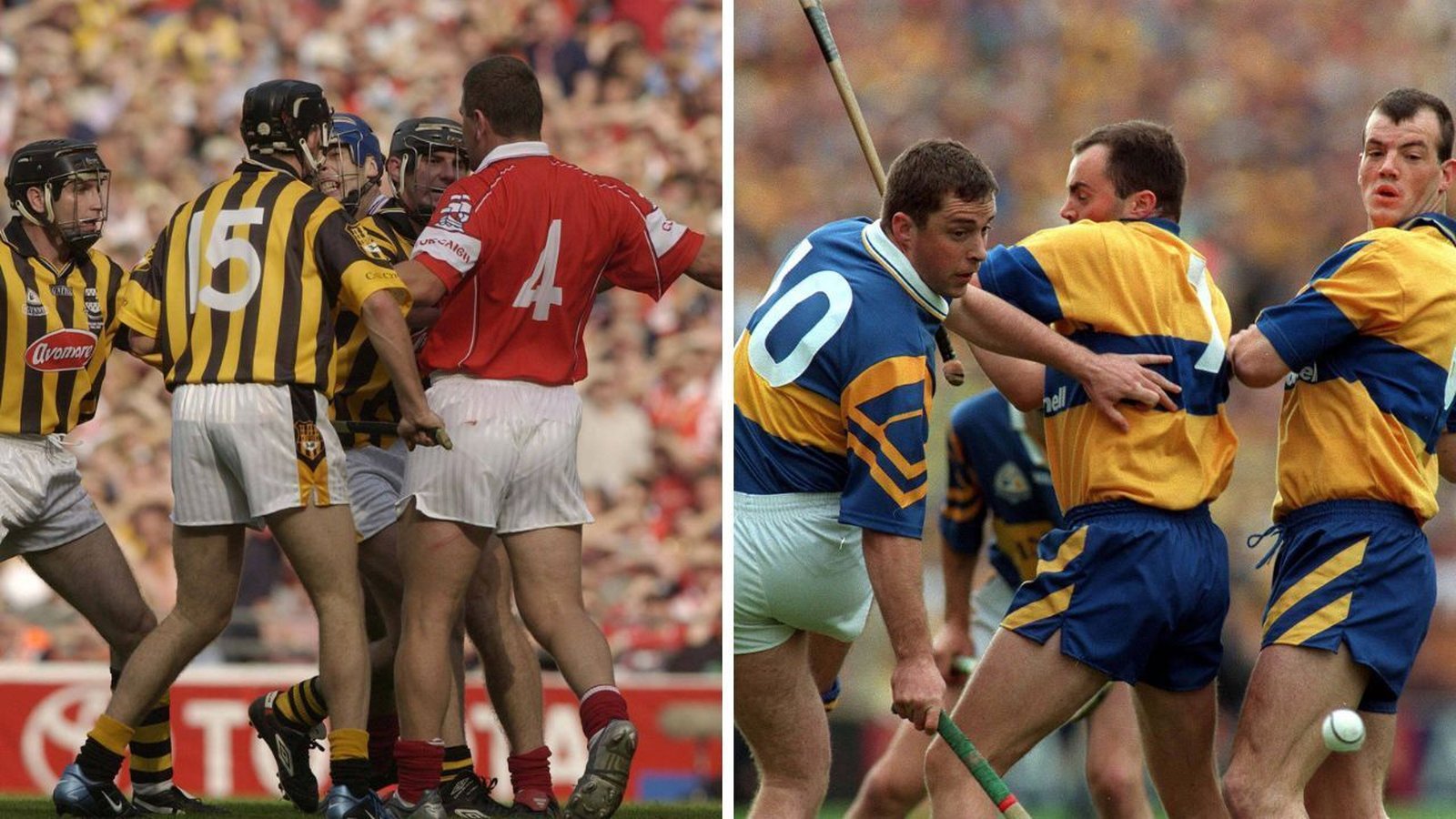
The third successive meeting of Clare and Kilkenny at the penultimate stage of the championship is almost something of a throwback, a rivalry built on purely knockout encounters.
Brian Lohan’s men enter Saturday’s meeting in desperate need of a result to avoid a third successive All-Ireland semi-final loss.
Considering the sides has only met on seven previous occasions in the championship prior to 2022, it is a rivalry that has bubbled along nicely in recent seasons, though the term rivalry might do a disservice to Kilkenny’s record in the head-to-head with the 1997 All-Ireland semi-final the only occasion they have failed to come out on top.
Ahead of Saturday’s meeting at Croke Park, we look back at other rivalries involving both counties.
Kilkenny v Cork, 1999 – 2006
The two sides at the top of hurling’s roll of honour have enjoyed a rivalry like no other, and the Cork-Kilkenny clashes were the opening chapters to Brian Cody’s unprecedented time in charge of the Cats.
The 1999 All-Ireland final was the start of the most modern rivalry, Jimmy Barry-Murphy’s young guns upsetting the odds to win on a scoreline from a different era, edging out the black and amber 0-13 to 0-12. In contrast, their most recent championship meeting, the 2021 All-Ireland semi-final, saw more scores in the opening 35 minutes alone.
Cody’s first All-Ireland final in charge was expected to be a maiden success, but the swashbuckling Rebels were the story of the summer. Half a dozen championship debutants – nine players under the age of 22 – were on board for a Munster title before getting past Offaly in a pulsating semi-final.
Kilkenny put another nail in the coffin of an ageing Clare on the other side to advance as firm favourites, yet in the September rain, it was the Rebels that led 0-05 to 0-4 at the break.
A Kilkenny surge moved them four points clear, but with Sean Óg Ó hAilpín keeping DJ Carey scoreless from play, Timmy McCarthy picking off three points from a largely midfield role and Brian Corcoran delivering a virtuoso display, it was Cork that prevailed.
It would be four years until they met in the decider again, but 2003, the first of three finals the sides would contest over the following four years, saw things begin to simmer with the rivalry building up off the pitch as much as on it.
In 2002, GPA representatives from both counties agreed that the league final would be used as a vehicle for a protest. Shirts would hang outside shorts and socks would hang low during the pre-match parade.
Cody quashed any talk of this within the Kilkenny camp, with Dónal Óg Cusack later critical of the Cats’ decision not to partake in the protest, describing them as the “GAA’s version of the Stepford Wives” in his autobiography.
With that subplot simmering away, on the pitch both sides were keen to prove who was top dog.
In the 2003 showpiece, a jittery first-half display and some wayward free-taking saw Cork trail by half a dozen points at the break, and while they staged an admirable fightback, an inspired Martin Comerford performance (1-04 from play) was enough to tilt the scales in Kilkenny’s favour.
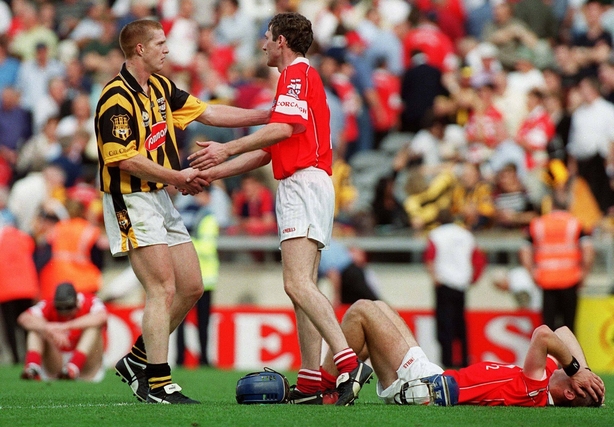
A year later and Cork exacted revenge, their free-flowing running game now in full flight as they gave a dominant second-half display to win by eight, Carey again held scoreless by the Rebel defence.
With Galway shocking Kilkenny in the 2005 All-Ireland semi-final and the Rebels maintaining their 100% record against the Tribesmen in deciders, the 2006 clash was a pivotal moment.
Could Cork, the game’s trendsetters with short puckouts, swift hand-passing and widespread movement, make it three-in-a-row? We didn’t know it at the time, but it was the Cats who were hellbent on history, embarking on a run of All-Ireland success that would see Tipperary halt their own drive for five in 2010.
“We have always felt that we could have finished Cody off in 2006 if we had beaten them in the All-Ireland final and completed a three in a row of titles,” mused Og Cusack in later years.
The Cats laid siege to Cork’s puckouts – “they were like frigging bees” centre-back Ronan Curran said in Blood Brothers, Henry Shefflin took the Rebels for eight points and Jackie Tyrrell was the leader in a teak tough Kilkenny defence.
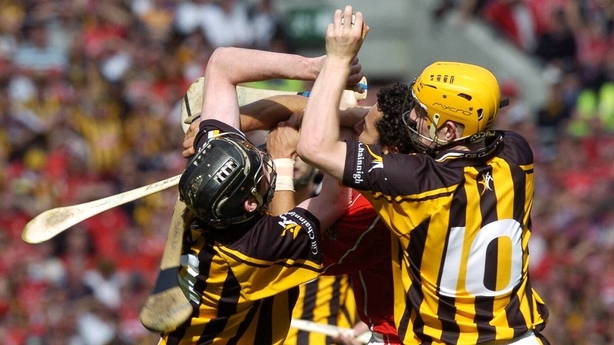
Tommy Walsh bowed out of the game with nine Celtic Crosses to his name, but that victory, along with the 2011 dethroning of rivals Tipperary to wrestle back Liam MacCarthy, were the sweetest of successes of decorated career.
“Them two finals stand out above all,” he said. “We weren’t the favourites going in, we weren’t expected to win them and we did. That pure elation and pure excitement those were two that stood out.”
The start of a decorated Kilkenny era effectively brought down the curtain on that Cork team.
In 2008 and 2010 they met in All-Ireland semi-finals, but only the embers of a rivalry remained, Kilkenny winning the games by a cumulative of 21 points.
The 2010 result was a crushing reminder of the order of power. Despite losing Brian Hogan and Henry Shefflin in the opening half, the Cats were 13 points to the good, the game effectively over as a contest.
The Rebels were desperate to half the drive for five, but were way off the pace required to cause an upset, slipping to their heaviest championship defeat since the 18-point drubbing at the hands of Limerick in 1996.
Clare v Tipperary, 1993 – 2003
In Clare minds – or that of Ger Loughnane at least – the seeds of this 90s rivalry were sown in Tipperary’s 18-point demolition of the Banner in the 1993 Munster final.
Nicky English was introduced as a substitute that day at the Gaelic Grounds, but Loughnane felt the forward disrespected his side by seemingly mocking them during the rout.
English always claimed that the reason for his laughter on the pitch was less to do with Clare and more to do with team-mate Declan Ryan and
“I felt he was treating me like an old cripple by holding onto the ball for so long to set me up in a scoring position, so having scored, I looked across at him and grinned,” he explained in his autobiography.
“Little did I know that the moment would burn a hole in certain Clare minds.”
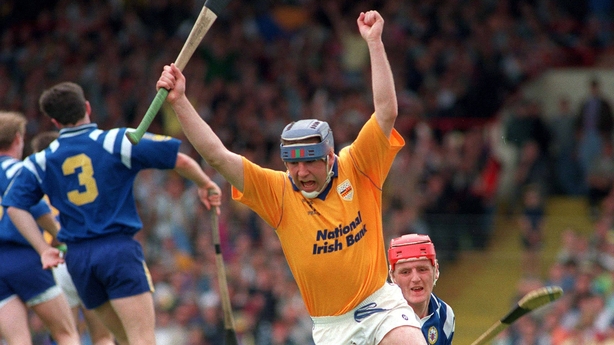
A year later and the Banner, under the stewardship of Tipperary native Len Gaynor, turned the tables on the Premier County, bringing an end to Babs Keating’s first stint in charge.
Clare’s provincial breakthrough in 95 was achieved without crossing paths with Tipp, and with an All-Ireland defence fell with a Munster semi-final defeat to Limerick, 97 was primed for a lively affair.
Loughnane had been fuelling the fire to his players ahead of the Munster final clash, English’s “slight” four years previous part of the ammunition that propelled them to just a fifth-ever provincial title, a second in three years.
Substitute David Forde’s goal was ultimately the difference between the sides, with captain Anthony Daly delivering his famous “we’re no longer the whipping boys of Munster” in his acceptance speech.
In the first year of the backdoor, Clare made inroads on their dismal head-to-head record with Tipp in the All-Ireland final.
We need your consent to load this YouTube contentWe use YouTube to manage extra content that can set cookies on your device and collect data about your activity. Please review their details and accept them to load the content.Manage Preferences
Trailing by four at the break, they started the second half with a scoring surge, Forde yet again making a significant contribution upon his introduction.
A five-point Clare lead was then reeled in before Jamesie O’Connor slung over the winning score from 50 yards out, John Leahy’s last-gasp effort to raise a green flag when a point down backfiring when Davy Fitzgerald made a smart save.
That victory elevated Clare to a new level, ensuring their place among pantheon of great sides, yet it was the Munster final win that held special resonance for Loughnane.
“The ’97 Munster final is the treasure of all treasures,” he later wrote. “Everything that day was just bliss. It wasn’t the All-Ireland final but the Munster final that was more important to us. That’s what people don’t understand.
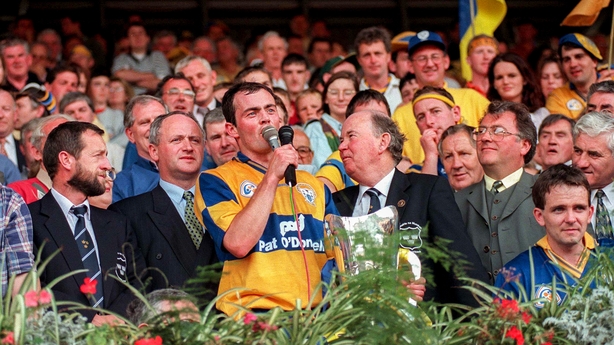
“Munster is magic because of local rivalries. Whatever changes are made, the Munster championship must stay. You look at the Munster championship and the passion it generates.
“Croke Park is business. There’s something spiritual about the Munster championship.”
Clare’s 10-point destruction of Tipp pointed to a team still capable of hunting down another Celtic Cross, inspired by Nicky English’s pre-match words to his troops in the opposition dressing room.
“‘Ssshh! Listen lads,’ Loughnane said to us,” Davy Fitzgerald wrote in his book. “We would hear English shouting ‘What do you do with wounded animals? Kill! Kill!’ We went berserk. Loughnane never had to finish his own team talk.”
Loughnane wrote that it was the “perfect display…enhanced because it was [against] Tipperary, but the performance was everything I strove for since I first trained a junior team.”
It was to prove to be that iconic side’s last great display
They came unstuck to Kilkenny and new manager Brian Cody in his first year in charge at the penultimate stage, but Loughnane decided to stick around for one more year.
It was however Tipp that brought the curtain down on his time in charge, the new kids on the block getting over an ageing Clare side in the 2000 Munster semi-final replay.
Loughnane departed, but the intensity was far from diminished. Tipp went on to land ultimate honours in 2001, aided by one-point win over Clare along the way.
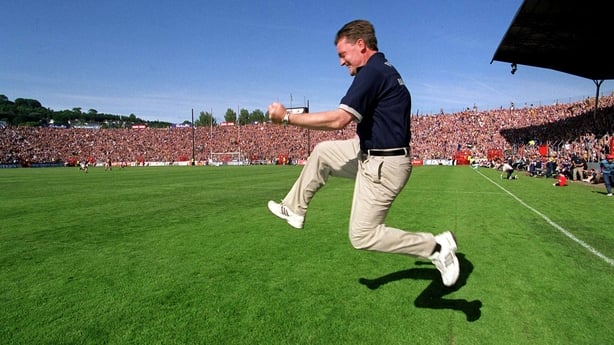
Tommy Dunne was the outstanding hurler that year, but one of his strongest memories he told the Irish Times was that narrow win over their neighbours.
“There was nearly world war three at the throw-in,” he said. “Gerry Quinn hit out across Mark (O’Leary) and broke his hurley when there was no ball in play. Clare were always the bully-boys and if you didn’t match it you were dead.”
The sides locked horns 10 times between 1993 and 2003, seven of those games at a time where there was no second chance.
The familiarity and second bite of the cherry seemed to ebb away at the level of intensity, with both sides taking a back seat to Cork and Kilkenny over the subsequent years.
“The crowds were nearly worn out from it at that stage,” Jamesie O’Connor said last year. “They couldn’t keep getting up for these games.”
Watch the All-Ireland Hurling Championship quarter-finals, Kilkenny v Clare (3pm on Saturday on RTÉ One) and Limerick v Cork (4pm on Sunday on RTE2). Both games available on RTE Player. Follow a live blog on rte.ie/sport and the RTÉ News app and listen to commentary on RTÉ Radio 1










